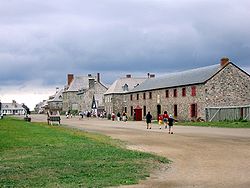| The Widow of Saint-Pierre | |
|---|---|
 Theatrical poster | |
| Directed by | Patrice Leconte |
| Written by | Claude Faraldo Patrice Leconte |
| Produced by | Frédéric Brillion Gilles Legrand Daniel Louis Denise Robert |
| Starring | Juliette Binoche Daniel Auteuil Emir Kusturica |
| Cinematography | Eduardo Serra |
| Edited by | Joëlle Hache |
| Music by | Pascal Estève |
| Distributed by | Alliance Films (Canada) [1] Pathé Distribution [a] (France) |
Release date |
|
Running time | 120 minutes |
| Countries | Canada France |
| Language | French |
| Budget | $13 million [3] |
| Box office | $7,074,234 [4] |
The Widow of Saint-Pierre (French : La veuve de Saint-Pierre) is a 2000 film by Patrice Leconte with Juliette Binoche, Daniel Auteuil and Emir Kusturica. Loosely inspired by an actual case, it tells the story of a disillusioned army officer whose love for his wife in her efforts to save a convicted murderer leads him to disobey orders.
Contents
The film made its North American debut at the 2000 Toronto International Film Festival. It was nominated for a Golden Globe Award in 2001 for Best Foreign Language Film and in that year was also nominated for two César Awards.

